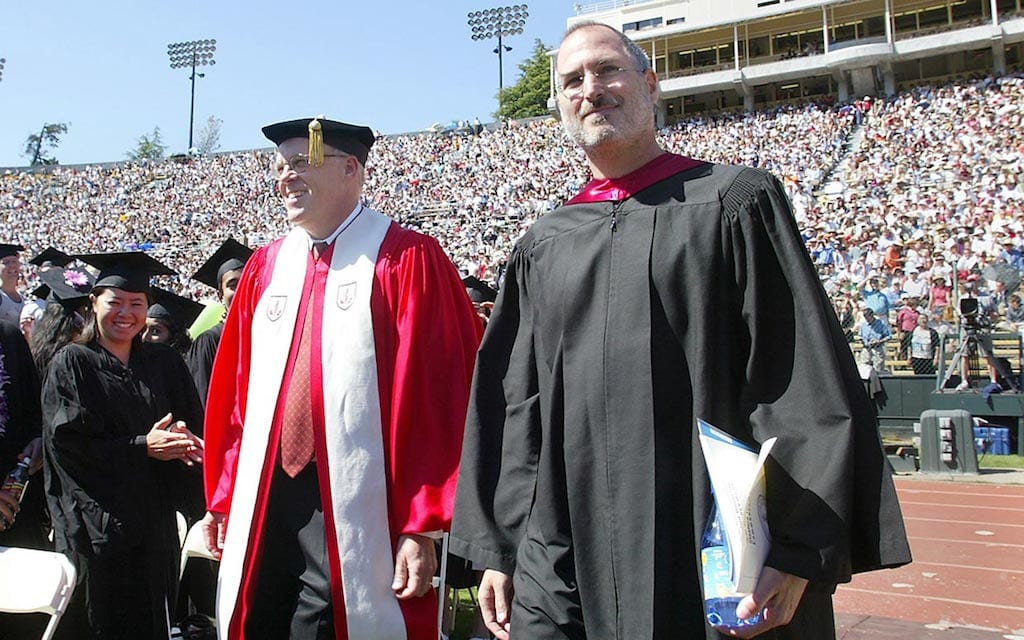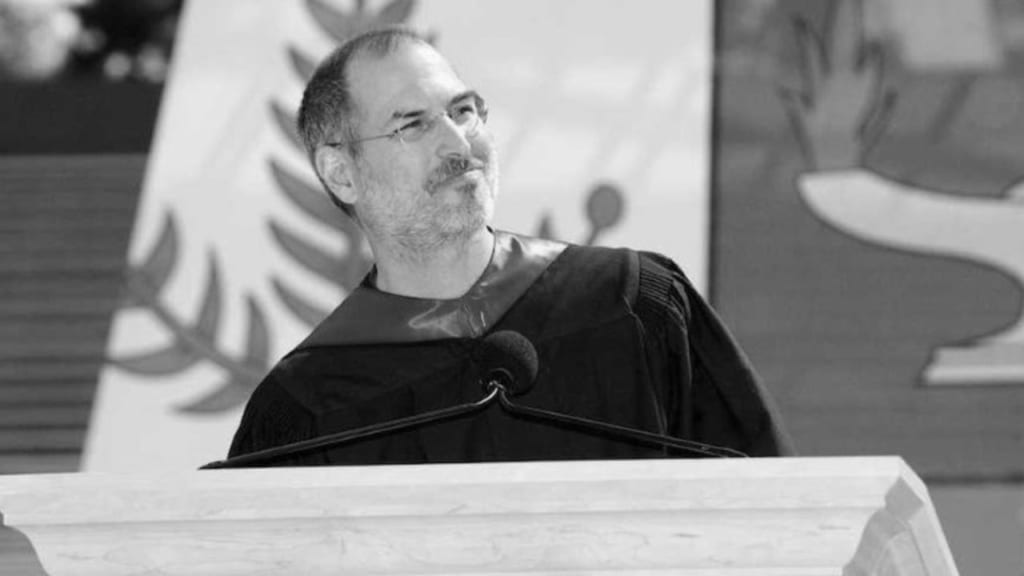ジョブズが本当に伝えたかったことを知りたくないですか。
スティーブ・ジョブズ(Steve Jobs)の伝説のスピーチを徹底解説する。日本語訳なしでも理解できるよう、単語と文法をわかりやすくご説明する。日本語訳を読んだだけではわからない、ジョブズの真の言葉を感じて欲しい。
このスピーチは、2005年のスタンフォード大学卒業生に向けたものだが、今なお、世界中の人々に感動を与え続けている。特にビジネスパーソンの皆さまにとっては必聴のスピーチだ。
なお、このスピーチは3つのストーリーで構成されている。このコラムでは2つ目のストーリーを解説する。1つ目のストーリーは「スティーブ・ジョブズの英語①|スタンフォード卒業式スピーチを徹底解説」で楽しんで頂きたい。
また、このコラムを楽しんだ後は、「スティーブ・ジョブズの発音②|スタンフォード卒業式スピーチを徹底解説」でジョブズから本物の英語の発音を学んで頂きたい。
2. スティーブ・ジョブズの英語|2nd ストーリー
(5:33)
My second story is about love and loss. I was lucky. I found what I loved to do early in life. Woz and I started Apple in my parents’ garage when I was 20. We worked hard, and in 10 years Apple had grown from just the two of us in a garage into a $2 billion company with over 4000 employees. We had just released our finest creation the Macintosh a year earlier, and I had just turned 30. And then I got fired.
loss /lɔ́(ː)s/ (名) 失ったもの
what I loved to do: “what” は先行詞を含む関係代名詞で「私がやりたいこと」の意。主節の動詞 “found” と時制を合わせて過去形になっている。
early in life: 人生の早い時期に
Woz : Steve Wozniak (アップルの共同設立者。Apple I、IIをほぼ独力で開発した)
garage /gərɑ́ː(d)ʒ/ (名) ガレージ、車庫
billion /bíljən/ (名) 10億
in 10 years Apple had grown from just the two of us in a garage into a $2 billion company with over 4000 employees: Apple設立から10年経った時 (このスピーチ時より過去) に、 “2 billion company” に成長したので、 “had grown” と過去完了になっている。 “grow from A into B” で「AからBへ成長する」の意。 “with” は「~と共に」から「〜を雇う」の意。ここでは「ガレージでの我々たった2人から、従業員4,000人以上の20億ドルの会社へ成長した」の意。
release /rilíːs/ (動) 発売する
creation /kriéiʃən/ (名) 作品
earlier /ə́ːrliər / (副) (時間的に) 前に
We had just released our finest creation the Macintosh a year earlier: “2 billion company” に成長した過去のある時点より更に “a year earlier” (1年前) に “release” したので過去完了。過去のある時点から1年前なので “earlier” (現在から1年前であれば “before”)。 “our finest creation” と “the Macintosh” は同格。
turn /tə́ːrn/ (動) 「〜へと方向を変える」から「~才になる」の意。
and I had just turned 30: “the Macintosh” を “release” してからすぐ (2 billion company に成長する前に) 30歳になったので、ここも過去完了。
fire /fáiər/ (動) 解雇する ⇨ get fired: “be fired” と同じ意味を表す受動態。「解雇される」の意。
And then I got fired: “2 billion company” に成長した後に “fired” されたので、ここは過去形。
(6:08)
How can you get fired from a company you started? Well, as Apple grew we hired someone who I thought was very talented to run the company with me, and for the first year or so things went well. But then our visions of the future began to diverge and eventually we had a falling out. When we did, our Board of Directors sided with him. So at 30 I was out. And very publicly out. What had been the focus of my entire adult life was gone, and it was devastating.
a company you started: “company” の後に関係代名詞 “that” もしくは “which” が省略されている。「あなたが始めた会社」の意。
as Apple grew: ここでの “as” は、接続詞で 「~なので」の意。全体では「アップルが成長したので」の意。
hire /háiər/ (動) 雇う
someone /sʌ́mwʌ̀n/ (名) ある人
talented /tǽləntid/ (形) 才能のある ⇨ talent /tǽlənt/ (名) 才能
someone who (I thought) was very talented to 〜: “I thought” は挿入語。カッコに入れるとわかりやすい。「〜する事にとても才能がある (と私が思った) ある人」の意。
run /rʌ́n/ (動) 経営する
or so: ~かそこら
thing /θíŋ/ (名) (複数形で) 物事
go well: うまくいく
vision /víʒən/ (名) 見通し、構想
diverge /dəvə́ːrdʒ/ (動) 枝分かれする
eventually /ivén(t)ʃuəli/ (副) 最終的に
falling-out (名) 仲たがい ⇨ fall out (群動) 口論する
When we did: “did” = “fell out”
board of directors: (アップルの) 取締役会
side with 〜: (群動) ~の側に付く ⇨ side /sáid/ (動) (“with” がなくても) ~の側につく
out /áut/ (形) ここでは「はずされて」の意。 ⇨ be out:外される
publicly /pʌ́blikli/ (副) 公然と ⇨ public /pʌ́blik/ (形) 皆に知られている
focus /fóukəs/ (名) 中心
entire /entáiər/ (形) 全部の
adult /ədʌ́lt/ (形) 大人の
What had been the focus of my entire adult life: ここまでが主語。 “what” は先行詞を含む関係代名詞で「〜のこと (もの)」の意。次に来る動詞 (was) が過去形で、その更に前に起こったことなので過去完了の形になっている。全体では「成人してからの全ての我が人生の中心だったこと」の意。
gone /gɔ́(ː)n/ (形) 「行ってしまった」から「消失した」の意。
devastating /dévəstèitiŋ/ (形) 衝撃的な
(6:37)
I really didn’t know what to do for a few months. I felt that I had let the previous generation of entrepreneurs down – that I had dropped the baton as it was being passed to me. I met with David Packard and Bob Noyce and tried to apologize for screwing up so badly. I was a very public failure, and I even thought about running away from the valley. But something slowly began to dawn on me I still loved what I did.
what to do: すべきこと
few /fjúː/ (形) ( “a” を付けない) ほとんどない、 (“a” を付ける) 少しの ⇨ a few months: 数ヶ月
previous /príːviəs/ (形) 前の
generation /dʒènəréiʃən/ (名) 世代
entrepreneur /ɑ̀ːntrəprənə́ːr/ (名) 起業家
let 〜 down: 「〜を下に落とす」から「〜の期待を裏切る」
I felt that I had let 〜 down 〜: 「〜の期待を裏切った」(“let 〜 down”) のは、「感じた」(“felt”) した時より前なので、 “had let” と過去完了の形になっている。次に続く “I had dropped 〜” も同じ理由で過去完了。
baton /bətɑ́n/ (名) バトン
(felt) that I had dropped the baton as it was being passed to me: “that” は “that I had let 〜” の “that” と同格。 “as” は接続詞で、ここでは「〜している時」の意。 “it” は “baton”。 “was being passed to me” は受動態の過去進行形で「私に手渡されていた」の意。全体の意味は「私に手渡されようとしている時に、バトンを落としてしまったと (感じた)」の意。
meet with 〜: (約束して) 〜と会う ⇨ meet /míːt/ (動) ~と会う
David Packard: ヒューレット・パッカードの共同創業者
Bob Noyce: インテルの共同創業者の1人
apologize /əpɑ́lədʒàiz/ (動) 謝罪する ⇨ apologize for 〜: 〜に対して謝罪する
screw up /skrúː/ /ʌ́p/ (群動) 大失敗する
badly /bǽdli/ (副) ひどく
failure /féiljər/ (名) ここでは「失敗した人」の意。
run away from 〜: ~から逃げ出す
the valley: Silicon Valley (シリコンバレー) のこと。サンフランシスコ・ベイエリアの南部のIT企業の一大拠点。
dawn on 〜: 「〜を照らす」から「~に理解され始める」の意。 ⇨ dawn /dɔ́ːn/ (動) 「夜が明ける」から「(真相などが) 分かり始める」の意。
something slowly began to dawn on me I still loved what I did: “something began to dawn on me” で「何かが私を照らし始めた」から「私は何かを理解し始めた」の意。 次に続く “I” の前に関係代名詞 “that” もしくは “which” が省略されている。先行詞は “something” で、全体の意味は「私は何かを理解し始めた。それは、私は、私がやったことをまだ好きだということだ。」。文法的には、 “loved” した時より過去に “did” しているので、 “I still loved what I had done” が正しい。 “what” は先行詞を含む関係代名詞で「〜のこと (もの)」の意。
(7:04)
The turn of events at Apple had not changed that one bit. I had been rejected, but I was still in love. And so I decided to start over. I didn’t see it then, but it turned out that getting fired from Apple was the best thing that could have ever happened to me. The heaviness of being successful was replaced by the lightness of being a beginner again, less sure about everything. It freed me to enter one of the most creative periods of my life.
turn /tə́ːrn/ (名) 転換点、曲がり角 ⇨ turn of event: 事態の変化、出来事の節目
bit /bít/ (名) 少し
had not changed that one bit: “that” は “I still loved what I did” つまり「やってきたことを好きだということ」の意。 “not 〜 one bit” は「少しも〜ない」。全体の意味は「〜は、私がやってきたことを大好きだということを、少しも変えなかった。」の意。なお、前文の “I still loved 〜” と思った時よりも更に過去のため過去完了。
reject /ridʒékt/ (動) 拒絶する ⇨ I had been rejected: 受動態で、かつ上記と同じ意味で過去完了。「私は拒否された」の意。
in love: 恋して
start over: もう一度やり直す ⇨ over /óuvər/ (副) もう一度
see /síː/ (動) 理解する
turn out 〜: 結局~であることが分かる
I didn’t see it then, but it turned out that: “see it” の “it” は “turned out that 〜” の “that” 以下のことを示す。 “but it” の “it” は漠然と状況を示す。
getting fired from Apple was the best thing that could have ever happened to me: “getting fired from Apple” が “that” 節内の主語。 “thing that 〜” の “that” は関係代名詞。 “could have ever happened to me” は仮定法過去完了の主節で「私に起こり得たであろう」の意。全体の意味は「アップルから解雇されたことは、私にそれまで起こり得たであろう最良のことだった」。
heaviness /hévinəs/ (名) 重苦しさ
replace /ripléis/ (動) ~を取り替える ⇨ be replaced by 〜: ~に取って代る
lightness /láitnəs/ (名) 軽快さ
The heaviness of being successful: ここまでが主語。「成功者としての重苦しさ」の意。
the lightness of being a beginner again: 「再び初心者になった軽快さ」の意。
less /lés/ (副) より少なく (littleの比較級)
less sure about everything: 「すべてにことについて確かではなかった」の意。 “(who was) less sure 〜” と “who was” を補足すると理解しやすい。 “who” は関係代名詞で先行詞は “a beginner”。
free /fríː/ (動) ~を自由にする ⇨ free A to 〜: A を自由に〜させる
creative /kriéitiv/ (形) 創造性に富んだ
period /píəriəd/ (名) 期間
(7:31)
During the next five years, I started a company named NeXT, another company named Pixar, and fell in love with an amazing woman who would become my wife. Pixar went on to create the world’s first computer animated feature film, Toy Story, and is now the most successful animation studio in the world. In a remarkable turn of events, Apple bought NeXT, and I returned to Apple, and the technology we developed at NeXT is at the heart of Apple’s current renaissance.
During the next five years: アップルから解雇されてからの5年間の意。
NeXT: 1985年にジョブズが創業。高等教育やビジネス市場向けのワークステーションを開発製造していた。
Pixar: 1979年にルーカスフィルム社が創立した部門が前身。1986年ジョブズらが1000万ドルで買収し「ピクサー」と名付けた。
fall in love with 〜: 「〜と一緒に恋の中に落ちる」から「〜と恋に落ちる」の意。
amazing /əméiziŋ/ (形) 素晴らしい
an amazing woman who would become my wife: “who” は関係代名詞で先行詞は “woman”。 “fell in love” した時点から見て未来に “wife” になったので “will” ではなく “would become 〜”。
go on to 〜: 「~へ進む」の意。 “on” は副詞で「続く」というニュアンスを持つ。全体では「続いて〜へと行く」のニュアンス。
animated /ǽnəmèitid/ (形) アニメの
feature film: 長編映画 ⇨ computer animated feature film: コンピューターアニメ長編映画
and is now the most successful〜: “is” の主語は “Pixar”
remarkable /rimɑ́ːrkəbl/ (形) 注目に値する (“turn of events” は前述参照)
develop /divéləp/ (動) 開発する
the technology we developed at NeXT: “technology” の後に関係代名詞 “that” もしくは “which” が省略されている。
at the heart of 〜: ~の中心で
renaissance /rènəsɑ́ːns/ (名) 再生(期)
(7:59)
And Laurene and I have a wonderful family together. I’m pretty sure none of this would have happened if I hadn’t been fired from Apple. It was awful-tasting medicine, but I guess the patient needed it. Sometimes life’s going to hit you in the head with a brick. Don’t lose faith. I’m convinced that the only thing that kept me going was that I loved what I did. You’ve got to find what you love. And that is as true for your work as it is for your lovers.
Laurene: ロリーン(ジョブズのパートナー)
pretty /príti/ (副) 非常に
sure /ʃúər/ (形) 確信して
I am pretty sure (that) 〜: “that” が省略されている。「“that” 以下のことを確信している」の意。
none of this would have happened if I hadn’t been fired from Apple: 仮定法過去完了。ここでは「もし私が〜していなかったら、これらのことは起こらなかったであろう」の意。
awful /ɔ́ːfl/ (形) ひどい
taste /téist/ (動) ~の味がする ⇨ awful-tasting: ひどい味の
medicine /médəsn/ (名) 薬
guess /gés/ (動) 推測する ⇨ “guess” の後に “that” が省略されている。
patient /péiʃnt/ (名) 患者 ⇨ ここではスティーブ・ジョブズのこと。
life is going to hit you: “be going to 〜” は「〜するだろう」の意。 “going to” は口語では “gonna” 「ゴナ」と発音される。
hits you in the head with a brick: “hit 人 in the head with 〜” で「〜で (人) の頭を殴る」の意。
brick /brík/ (名) れんが
faith /féiθ/ (名) 信念
convince /kənvíns/ (動) 確信させる ⇨ be convinced that 〜: (“that” 以下)のことを確信する
keep A 〜ing: Aを〜し続ける
the only thing that kept me going: ここまでが “that” 節内の主語。“thing” の次の “that” は関係代名詞で先行詞は “thing” で「私を進み続けさせたただ一つのこと」の意。
that I loved what I did: “what” は先行詞を含む関係代名詞で「〜すること (もの)」の意。 “that” 以下全体では「私は私がしたことを大好きだったということ」の意。
have got to 〜: = have to (口語では “got” を入れる場合が多い)
what you love: “what” は先行詞を含む関係代名詞で「あなたが愛すること」の意。
that is as true for your work as it is for your lovers: “that is” の “that” と “it is ” の “it” は、両方とも前文全て (You’ve got to find what you love.) を示している。 “that is true for your work” と “it is (true) for your lovers” を “as 〜 as …” (… 同様 〜) でつなげている。「それはあなたの恋人について同様、仕事についても真実である」の意。
(8:27)
Your work is going to fill a large part of your life, and the only way to be truly satisfied is to do what you believe is great work. And the only way to do great work is to love what you do. If you haven’t found it yet, keep looking. And don’t settle. As with all matters of the heart, you’ll know when you find it. And, like any great relationship, it just gets better and better as the years roll on. So keep looking. Don’t settle.
fill /fíl/ (動) いっぱいに満たす
way /wéi/ (名) 方法
truly /trúːli/ (副) 偽りなく
satisfied /sǽtisfàid/ (形) 満足した
the only way to be truly satisfied: “way to 不定詞” で「〜の方法」。ここでは “to be satisfied” と受動態。全体の意味は「偽りなく満足する唯一の方法」。ここまでが主語。
to do what you believe is great work: “you believe” は挿入語。カッコに入れるとわかりやすい。 “what” は先行詞を含む関係代名詞で「〜のこと(もの)」の意。 “what is great work” で「素晴らしい仕事であること」の意。 “you believe” を含めると「素晴らしい仕事であるとあなたが思うこと」の意。
to love what you do: この “what” も先行詞を含む関係代名詞。全体の意味は「あなたがしていることを大好きになること」。
If you haven’t found it yet: 「経験」を表す現在完了形で「まだそれを見つけていないのであれば」の意。 “it” は “what you believe is great work”。
keep looking: “keep 〜ing” で「〜し続ける」。 “look” はここでは「探す」。命令形なので「探し続けろ」の意。
settle /sétl/ (動) 落ち着く
as with 〜: ~のように
matters of the heart: 「ハートのこと」から「恋愛」の意。
you’ll know when you find it: ここでは “know” は自動詞で「知る」の意。 “when” 以下は副詞節のため、主節と同じく未来を表す場合でも “will” はつけずに現在形。全体では「それを見つけた時、あなたはわかる」の意。 “it” は “what you believe is great work”。
like /láik/ (接) (口語) ~のように
get better: 「良くなる」 “get” は「(~の状態に) なる」の意。 主語の “it” は漠然と状況を示す。
as: ここでは「~につれて」の意。
roll on: “roll” は「転がる」、“on” は「つづく」のニュアンス。 “roll on” で「転がり続ける」から「(時が) 経つ」の意。
つづきは「スティーブ・ジョブズの英語③|スタンフォード卒業式スピーチを徹底解説」で楽しんで頂きたい。

『英語独学完全マニュアル』
独学で効率的に習得する科学的学習法の全て(全79ページ)
英語は独学が基本です。しかし、「自分の学習方法が正しいかどうか…」不安に思っていませんか?本書は、英語の学習方法についてお悩みの皆さまに、第二言語習得研究と脳科学(神経科学)研究の知見に基づいた真に効率的な英語学習法をご紹介する解説書です。
無料eBookの主な内容
- 単語・文法・発音の効率的な基礎力強化方法
- インプット(読む・聞く)能力向上のための英語脳作りトレーニング法
- アウトプット(話す・書く)能力向上のためのリハーサル・トレーニング法
- 学習計画の立て方と効率性を上げるための学習習慣
そろそろ本気で英語を習得したいとお考えの方におすすめです。また、「英会話スクールに通っているけど思うように上達しない…」「TOEICで高得点を取ったけど話せない…」などでお悩みの皆さまも是非ご一読ください。



